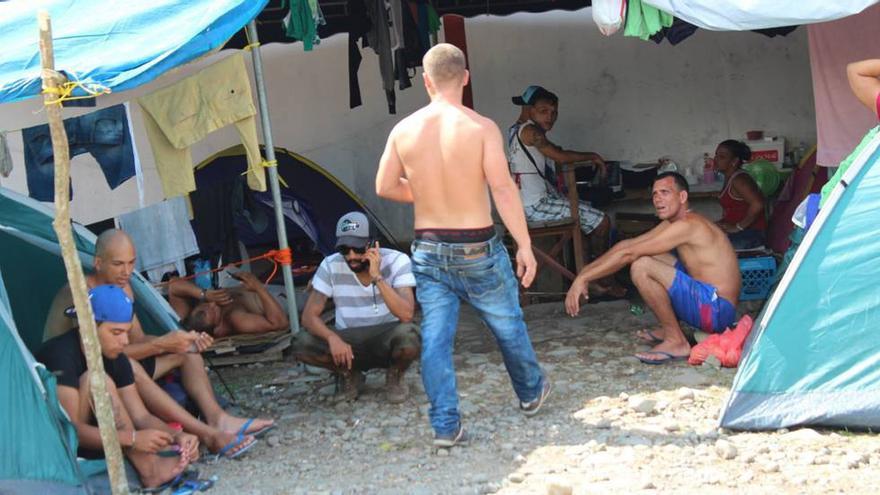
![]() 14ymedio, Havana, 22 July 2021 – On Tuesday, the Costa Rican government expanded the scope of the special category of asylum for Cubans, Venezuelans and Nicaraguans, which it began to implement in mid-November of last year. In order to protect those who are denied refuge and “are in a vulnerable condition,” the General Directorate of Migration and Foreigners (DGME) extended the measure.
14ymedio, Havana, 22 July 2021 – On Tuesday, the Costa Rican government expanded the scope of the special category of asylum for Cubans, Venezuelans and Nicaraguans, which it began to implement in mid-November of last year. In order to protect those who are denied refuge and “are in a vulnerable condition,” the General Directorate of Migration and Foreigners (DGME) extended the measure.
The procedure will take into account those migrants who “have requested refugee recognition after January 1, 2010 and before March 18, 2022” and remained “continuously in the national territory during the same period. In addition, to qualify there must be proof that that person was denied shelter between January 1, 2010 and December 15, 2021.
With this new expansion of the special category, the Costa Rican authorities intend to provide migrants with legal permanence in the country and provide the corresponding documentation so that they can carry out work activities. Applications will be received until February 28, 2022.
The DGME justified the decision based on its migration statistics projections for this year, in which it estimates that some 26,863 people from Cuba, Nicaragua and Venezuela “could benefit from this category.”
Migration added that there were months in which few applicants were reported, such as February, when only 597 people completed the paperwork for the category, so it determined to make these “modifications, in order to achieve greater access to the category.”
In 2020 the immigration authorities states that the situation in these three countries prompts it “to carry out a differentiated approach to the migratory situation of people who, due to their own situations, will not receive refuge or the authorization of legal permanence, but who will not leave the national territory, both due to the situation of the global pandemic caused by Covid 19, and the precarious situation in their countries of origin.”
In addition, they note that, since 2014, Costa Rica has registered a considerable increase in applications under refugee status by Venezuelans, Nicaraguans and Cubans. Regarding the latter, they say that “they are changing their migratory behavior” and are seeking to establish themselves in the Central American country.
In 2018, Cuba and Costa Rica signed an agreement on migration matters to enhance cooperation between both countries in the fight against irregular migration, human smuggling and trafficking, as well as associated crimes.
At the beginning of last June, a group of at least 150 Cubans who were traveling irregularly on three buses in southern Costa Rica was intercepted by immigration agents. The island’s nationals declared to the authorities that their intention was to continue to Costa Rica’s northern border on their way to the United States.
Hundreds of nationals of the Island who live in countries such as Guyana, Suriname, Uruguay, Brazil, Chile, Peru and Ecuador, are heading to the north of Mexico to cross the border and request political asylum in the United States, after the election of Joe Biden and the announcement of a more tolerant policy on immigration.
Between 2015 and 2016, thousands of Cuban migrants were stranded for several months in Costa Rica and other Central American countries waiting to be able to continue their journey to the United States and after Nicaragua decided to close its border with Costa Rica on the grounds of avoiding a humanitarian crisis and illegal emigration.
The wave of Cuban migrants to the United States grew by almost 80% in that period, in the face of the fear that the thaw between Washington and Havana would put an end to the migratory advantages enjoyed by Cubans under the Wet foot/dry foot policy, eliminated in 2017 by Barack Obama.
Months later, the migrants were able to fly to the southern border of the United States thanks to exceptional coordination by the governments of Mexico, Costa Rica, El Salvador, Guatemala and Panama.
____________
COLLABORATE WITH OUR WORK: The 14ymedio team is committed to practicing serious journalism that reflects Cuba’s reality in all its depth. Thank you for joining us on this long journey. We invite you to continue supporting us by becoming a member of 14ymedio now. Together we can continue transforming journalism in Cuba.
